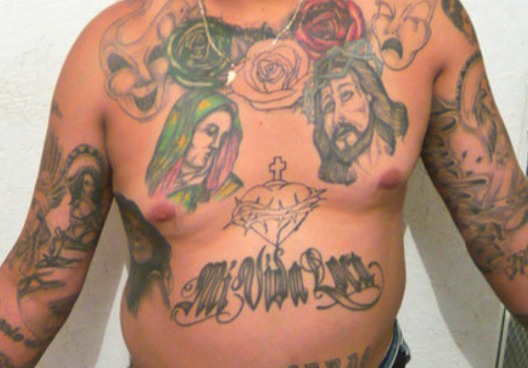As part of his application for US permanent residence, native Mexican Hector Villalobos traveled back to Mexico from Colorado to attend to his visa interview with a US immigration officer. In order to complete his application process, he needed to stay for a few months in his home country.
 Officer refused the tattooed guy
Officer refused the tattooed guy
Seven months later, a US consular officer did not allow him to return to the US to see his American wife and children after noticing his tattoos, which the officers suspected as having an affiliation with violent gangs in Mexico.
Villalobos’ wife explained that the tattoos are just like many other American tattoos and have nothing to do with any criminal organization. Villalobos added that he got part of his body tattoos in Mexico, and others in the United States because he thought they were cool.
For the past few years, the US government, which is very concerned about foreign gangs coming to the country, prompted to delay or refuse green card applications to some alien nationals with tattoos.
Tattoo Checks
Even though the tattooed alien nationals have no criminal records, refusals are made based on immigration section that explains inadmissibility based on national security grounds, and on potential affiliation with some criminal organization.
According to a spokesperson for the State Department’s Bureau of Consular Affairs, the existence of tattoos will not suffice to refuse or deny an application. She further said that more attention is being given to tattoos as indicators of a gang affiliation during the visa process as the law enforcement has an adept knowledge on the relationship between gangs and tattoos.
There must be a reason to believe that an indication of an affiliation with a gang or an involvement with an organized crime exists.
Most immigrants affected by the mandate are undocumented nationals who can meet the minimum criteria for the status they are applying, like Villalobos.
Decision vs. critics
- Many lawyers and criminologists held that several tattoo designs that bother immigrants convey gang membership, which have been widely adopted by the public and has entered the popular culture or mainstream.
- The Federation for American Immigration Reform, through its spokesman Ira Mehlman, held that, “If you are sporting a gang tattoo, it is reasonable for a consular officer to investigate if you have gang affiliations.”
- Thomas Boerman, a person who testified as an expert on gangs, believed that the problem lies on the competence of US officials to interpret tattoos.
- Another immigration lawyer from Denver Colorado made a comment that the decisions of US officers may encroach upon people’s rights particularly on the first amendment on freedom of speech and of expression.
- The American Immigration Lawyers Association escalated the issue at a consular meeting in Mexico City last April.
Villalobos’ Proof
Villalobos Stated that his record is clear and will attest to the truth:
- The Colorado Bureau of Investigation made it clear that Villalobos has never been arrested.
- An elementary-school teacher issued a notarized letter describing Spouses Villalobos as “supportive, involved parents that are always the first to volunteer for classroom activities.”
Entering US with Tattoos?
Immigration laws are complex. An applicant will need the assistance of an immigration lawyer to abandon the risk of losing a status or an opportunity to obtain a legal status, and to fulfill an applicant’s immigration objective.
Niren and Associates, an immigration firm existing for over 25 years, can surely help you with all your immigration problems. Having tattoos is not enough to deny one a US visa. It is therefore best to consult an immigration attorney who can help you establish the truth to an official consulate that you are not affiliated with any gangs.
Get your case assessed by calling 1-877-296-0874 or send your message to info@visaplace.com.



 Officer refused the tattooed guy
Officer refused the tattooed guy